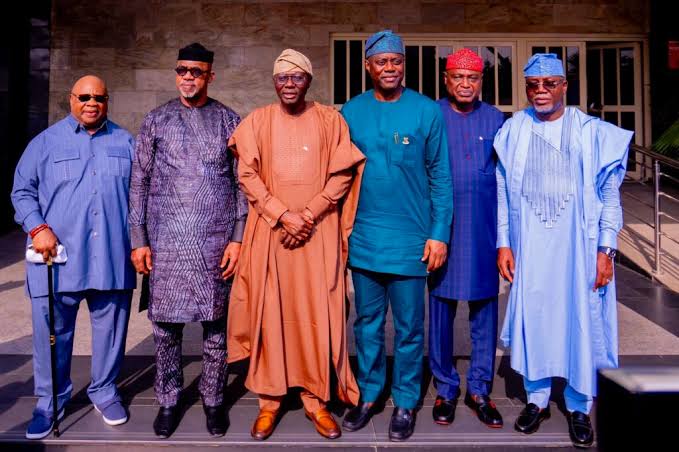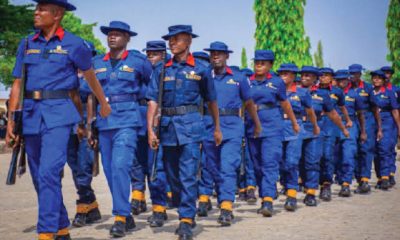
Governors team up to unveil joint security outfit to tackle crimes, Boko Haram influx
Governors team up to unveil joint security outfit to tackle crimes, Boko Haram influx
The South-West Governors Forum convened yesterday to announce plans for a new regional security outfit aimed at tackling banditry and other criminal activities.
In addition to strengthening security, the governors agreed to create joint food hubs to combat rising food prices in the region.
Governor Babajide Sanwo-Olu of Lagos State shared these decisions in an 11-point communiqué following a closed-door meeting at the Lagos House in Ikeja. Governors in attendance included Seyi Makinde (Oyo), Lucky Aiyedatiwa (Ondo), Biodun Oyebanji (Ekiti), Dapo Abiodun (Ogun), and Ademola Adeleke (Osun).
The meeting, which began at 12:15 pm, focused on addressing shared concerns and regional priorities, including security, agriculture, economic collaboration, food security, and the establishment of the South-West Development Commission.
After extensive deliberations on key issues affecting the South West, Sanwo-Olu, who read the communique, said: “The Forum commends the South-West governors for maintaining relative peace and security in the region, particularly during the recent festive period.
“Acknowledging the threat posed by ISWAP activities in parts of the South-West, the Forum strongly condemns any threat to the region’s security. It encourages enhanced collaboration between the Nigeria Police Force and local security outfits, urging them to remain vigilant. It also commits to taking necessary actions to counter these threats.
“It further agreed to establish a Joint Surveillance Monitoring Team to oversee and coordinate security efforts across the South West region. Additionally, the Forum resolved that its Special Advisers on Security would collaborate on intelligence gathering and sharing between states security agencies, local security networks and Federal law enforcement authorities.”
On the establishment of the South West Development Commission, SWDC, the governor’s said: “The Forum commends the Federal Government and the Senate for establishing the commission and collectively agreed to situate its headquarters at Cocoa House, Ibadan, Oyo State.
“It acknowledges the efforts of Odu’a Investment Company Ltd. in efficiently managing joint assets of the South-West region over the past five years.”
On food security measures, they said: “Recognising the need for food security, the Forum encourages collaboration among South West States to implement collective measures aimed at curbing food inflation in the region.
“It expresses concern over the activities of unscrupulous middlemen who deliberately inflate prices of goods and commodities in South-West markets. It has, therefore, agreed to establish a State Food Inflation Joint Monitoring Team and also the establishment of Aggregation Centre /Food Hubs to foster inter-state collaboration and mitigate food inflation.
“It commends the Development Agenda for Western Nigeria, DAWN, Commission for its improved performance over the past twelve months and encourages it to continue working diligently with South-West Commissioners for Agriculture on industrialization and infrastructural development across the region.”
News
Police crack down on viral ‘self-kidnapping’ schemes, issues directives to DPOs, Area Commanders

Police crack down on viral ‘self-kidnapping’ schemes, issues directives to DPOs, Area Commanders
The Police Command in Lagos State, says it is monitoring social media spaces, to uncover and tackle the wave of staged kidnappings in parts of the state.
The command revealed that several social media videos of kidnapping incidents which had sparked fear and consequent ransom payment, were carefully orchestrated scams.
In an interview with the News Agency of Nigeria (NAN) on Sunday, the command’s spokesperson, SP Abimbola Adebisi, said that the Commissioner of Police, Mr Olohundare Jimoh, had deployed Tactical Squads and anti-crime units, to strengthen rapid response.
She said that Area Commanders and Divisional Police Officers (DPOs) had also been directed to engage community leaders and residents, to improve information sharing.
“The command is also closely monitoring reports on social media and other platforms to promptly verify and address any incidents that may cause public anxiety,” she said
She said that in recent days, the command had recorded several fake abductions and consequent extortions.
“One such case involved a 26-year-old housewife whose supposed abduction set off alarm bells across borders.
“Her husband, living in South Africa, received frantic reports that armed men had kidnapped his wife in Lagos.
“The ransom demand was steep N10 million before it was negotiated down to three million naira,.hoping to save his wife’s life, he paid N2.5 million, yet, she was not released.
“It was that inconsistency that triggered deeper police scrutiny; A special squad of the Lagos State Police Command was deployed and wat they uncovered was not a hostage situation, but a carefully choreographed scam,” she said
The police said that the alleged victim had staged the kidnapping with the help of an accomplice in Osun state, who supplied a SIM card used to negotiate the ransom on WhatsApp.
According to the police, the victim later confessed, adding that even the iphone she claimed was stolen during the abduction, had already been sold.
“In a related development, the Command apprehended five suspects aged between 15 and 20 years, for orchestrating another fake kidnapping that went viral on social media.
“Police investigations revealed that a 15-year-old boy, with the help of four friends, staged his own abduction in a friend’s room in the Ago Palace area of Lagos to extort money from his mother.
“A ransom of N1.7 million was paid before detectives traced the transaction through a POS terminal, leading to the arrest of the suspects.
“The case, initially reported as a missing person incident on Nov. 26, 2025, had triggered widespread panic before the truth emerged.
“Similarly, the police apprehended a young couple for allegedly faking the wife’s kidnap, to extort N10 million from relatives and friends.
“Investigations showed that the scheme was motivated by financial hardship and the husband’s failed attempts to return to the United States,” she said
The police said that the plot unraveled at a school in Cappa, Lagos, after security personnel became suspicious of the couple’s conduct and alerted the police.
Th police said that the 19-year-old wife had admitted to planning what she described as a “prank kidnapping,” claiming that she had “acted” to help her husband cope with frustrations over his travel plans.
The spokesperson urged the public to remain vigilant and promptly report suspicious activities, stressing that security is a shared responsibility.
Adebisi urged residents to remain law-abiding and to verify distress calls before taking action.
The image maker warned the public against false reporting, criminal deception and acts capable of diverting critical security resources.
She advised families to establish internal verification codes and maintain regular communication with their loved ones.
Meanwhile, Adebisi warned criminal elements to desist from all forms of crime, assuring residents that the command would continue to intensify efforts to safeguard lives and property across the state.
She urged citizens to cooperate with the police by providing credible and timely information, as public support remains vital in tackling crime.
“Avoid rushing to transfer money without confirmation and promptly report suspicious activities to the nearest police station or through the command’s emergency numbers: 07061019374, 08065154338, 08063299264 and 08039344870, ” she said.(NAN)
News
ICPC files criminal charge against Senior Lawyer over alleged UK property fraud

ICPC files criminal charge against Senior Lawyer over alleged UK property fraud
The Independent Corrupt Practices and Other Related Offences Commission (ICPC) has filed a criminal charge against Chief Mike Ozekhome, SAN, over allegations bordering on fraud in relation to a London property.
The ICPC, in a three-count charge filed by its lawyer, Osuobeni Akponimisingha, Head, High Profile Prosecution Department, at the Abuja High Court, accused Ozekhome of complicity in the large-scale corruption case.
The News Agency of Nigeria (NAN) reports that the fresh charge, marked: FCT/HC/CR/010/26 dated and filed Jan. 16, named the senior lawyer as sole defendant.
The charge was sighted on Sunday.
Count one alleged that Ozekhome, 68 years, of No. 53, Nile Street, Maitama, Abuja, sometime in August 2021 or thereabout in London, within the jurisdiction of the court, directly received House 79, Randall Avenue, London NW2 7SX, purportedly given to him by one Mr Shani Tali.
The act he knew constitutes a felony and thereby committed an offence contrary to Section 13 and punishable under Section 24 of the Corrupt Practices and Other Related Offences, Act, 2000.
In count two, Ozekhome was alleged to have, sometime in August 2021 or thereabout, while being a legal practitioner and Senior Advocate of Nigeria did make a false document with a Nigeria passport: A07535463, bearing the name of Mr Shani Tali.
The commission alleged that the senior lawyer did this with plan to use same to support claim of ownership of property known and described as “79, Randall Avenue, London NW2 78X with intent to commit fraud.”
It said the offence is contrary to Section 363 and punishable under Section 364 of the Penal Code CAP 532 Laws of the Federal Capital Territory Abuja, 2006.
Count three accused Ozekhome of dishonestly used as genuine, a false “Nigeria passport A07535463, bearing the name of Mr Shani Tali to support claim of ownership of property known and described as ’79, Randall Avenue, London NW2 7SX,’ when he had reason to believe that the said document was false.
The ICPC said the offence is contrary to Section 366 and punishable under Section 364 of the Penal Code CAP 532 Laws of the Federal Capital Territory Abuja, 2006.
In support of the charge are the list of exhibits which include a case number: REF/2023/0155 (judgment) dated Sept. 11, 2025; extra-judicial statement of the defendant dated Jan. 12, 2026.
Others are interim forfeiture proceeding in respect of House 79, Randall Avenue, London NW2 7SX at the Federal High Court; a letter dated Dec. 18, 2025; a data page of Shani Tali and any other relevant documents being awaited relating to the case.
The anti-corruption commission, in its proof of evidence, listed the witnesses to testify against the defendant, including Mr Wakili Musa and Mr Tosin Olayiwola, who are both investigators with ICPC.
Besides, a representative of Nigerian Immigration Service (NIS), whose name was not mentioned in the proof of evidence, is also expected to give evidence to establish the case against the senior lawyer.
Others are Mr Ebenezer Nduo and Mr Blessing Monokpo who are also investigators with the ICPC, and any other vital witness by way of subpoena or filing additional list of witnesses.
As at the time of filing the report, the case is yet to be assigned to a judge.
NAN recalls that ICPC had opened an investigation into the prominent Nigerian lawyer, Ozekhome, following a damning judgment of a London property tribunal that linked him and others to a web of fraud and forged documents.
The commission’s probe was triggered by a petition from Olanrewaju Suraj, head of the Human and Environmental Development Agenda (HEDA).
The petition had referenced the British court judgment and accused Ozekhome and several others of conspiring with corrupt Nigerian officials to procure fake national identity documents in a bid to “fraudulently claim ownership” of the North London house.(NAN)
News
Tinubu’s Minister’s nine Children set to wed same day in Abuja

Tinubu’s Minister’s nine Children set to wed same day in Abuja
Plans are nearing completion for the wedding ceremony of nine children of the Minister of State for Defence, Bello Matawalle, as details of the event continue to gain attention online.
An invitation card for the ceremony, featuring the minister’s photograph, circulated widely on social media on Saturday.
The card states that the weddings will be held at the Central Mosque, Abuja, by 1:30 pm on February 6.
The names of the children listed on the invitation are Ibrahim, Suraj, Safiya, Maryam, Aisha, Fahad, Muh’d, Nana Firdausi, and Farida.
Providing further clarification, the spokesperson for the All Progressives Congress in Zamfara State, Yusuf Idris, confirmed to Sunday PUNCH that the group includes five sons and four daughters.
He said, “By the grace of God, the ceremony will be conducted at the Abuja Central Mosque on February 6. I also want to say that the minister’s children who are getting married are five sons and four daughters.
“I am among the committee members for this great occasion, and as I speak to you now, arrangements have reached an advanced stage to ensure a smooth ceremony in Abuja next month.”
-
6 years ago
Our situation in Kano terrible – Gov Ganduje cries out
-

 News12 months ago
News12 months agoFG pledges commitment to enhance Police officers Welfare, implement Tinubu’s 8-point agenda for NPF
-

 News11 months ago
News11 months agoBREAKING; NSCDC gets approval to commence 2025 recruitment exercise
-

 News9 months ago
News9 months agoAlleged cocaine deal: Court issues orders in suspended DCP Abba Kyari’s case
-

 News12 months ago
News12 months agoDPO under investigation for allegedly taking teenage girl to his home while in police custody
-

 News12 months ago
News12 months agoJUST IN; Commissioner of Police bows out of Service
-

 News9 months ago
News9 months agoJUST IN; Police Inspector dies watching Arsenal match
-

 News12 months ago
News12 months agoBREAKING; NLC declare nationwide protest


